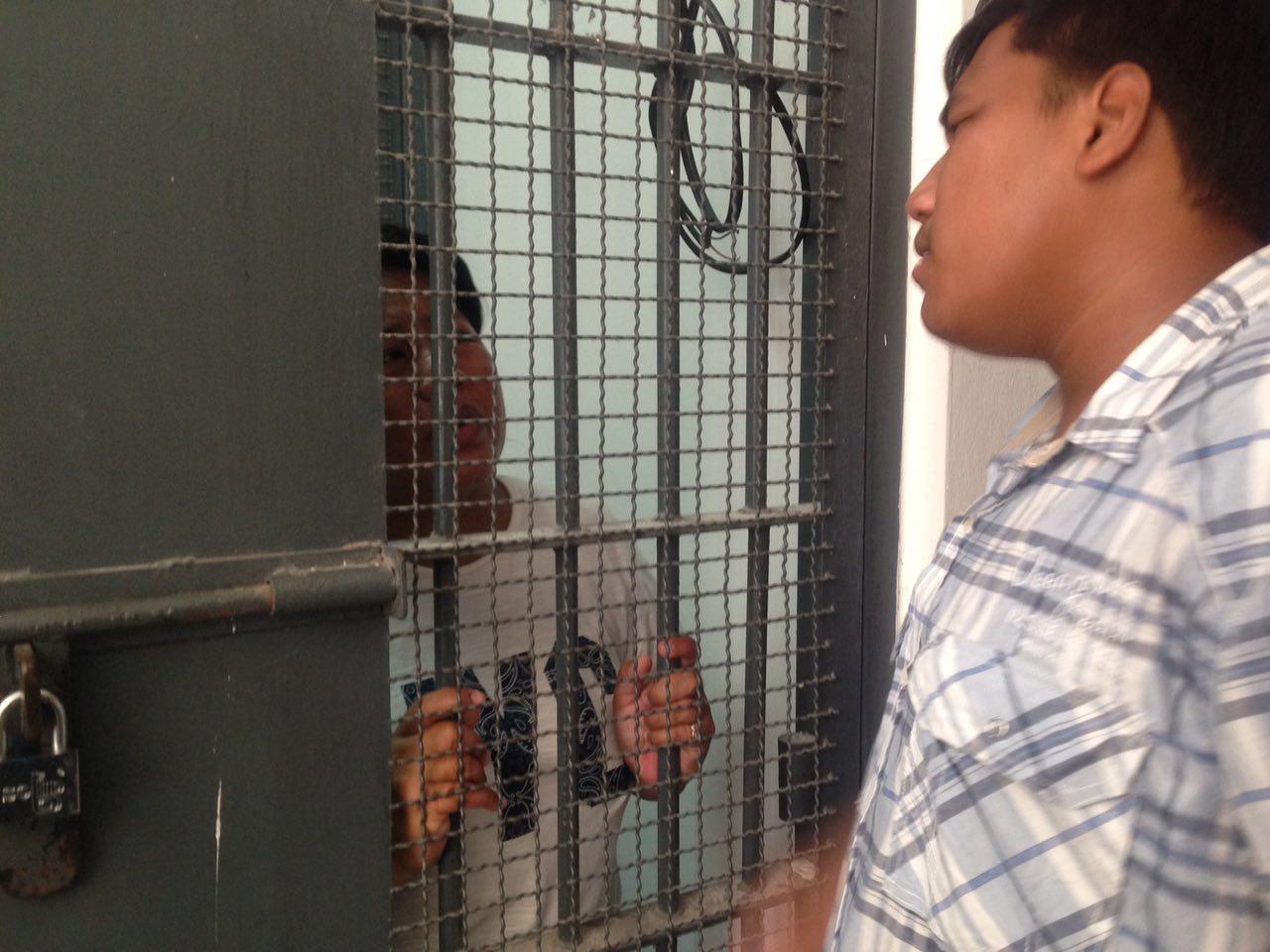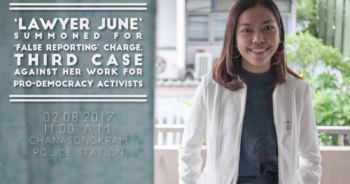“Yesterday plainclothes officers came to my house around noon. They photographed my place and my family members. They also tried to monitor our activities and whereabouts, and even threatened us with the junta’s order. These actions cause our family a great deal of stress and concerns about our safety and privacy.”
Ms Chonthicha Jaengrew, Facebook Post, 28 June 2016
“A visit by military personnel at my girlfriend’s house is a form of threat and intimidation. It was meant to scare her not to visit me in prison, and to make me feel like I have no one left. But my girlfriend did nothing wrong.”
Mr. Rangsiman Rome gave an interview while in remand, 28 June 2016
Under the governance of the National Council for Peace and Order (NCPO), the ruling military junta, not only activists, movement leaders, politicians, students, or politically active citizens become targets for summons, house visits, or prosecutions by military personnel, but also the multitude of harassments aimed at intimidating families and relatives of the said people regardless of their dissociation with any political activities.
These incidents are not new, but one of the main strategies the junta continually carried out to silence any opposing thoughts, and to deliberately and structurally control social expressions since the coup. It poses as one of the junta’s major instruments of social control, and a means to violate human rights throughout the past two years.
This report will exemplify cases of the post-coup junta’s practice against the targets’ family members who are not associated with any political activities, in addition to other forms of harassments against the relatives of students, activists, and political exiles under the junta’s regime. The practice has continued in the run-up to the Constitution Referendum dated 7 August 2016.
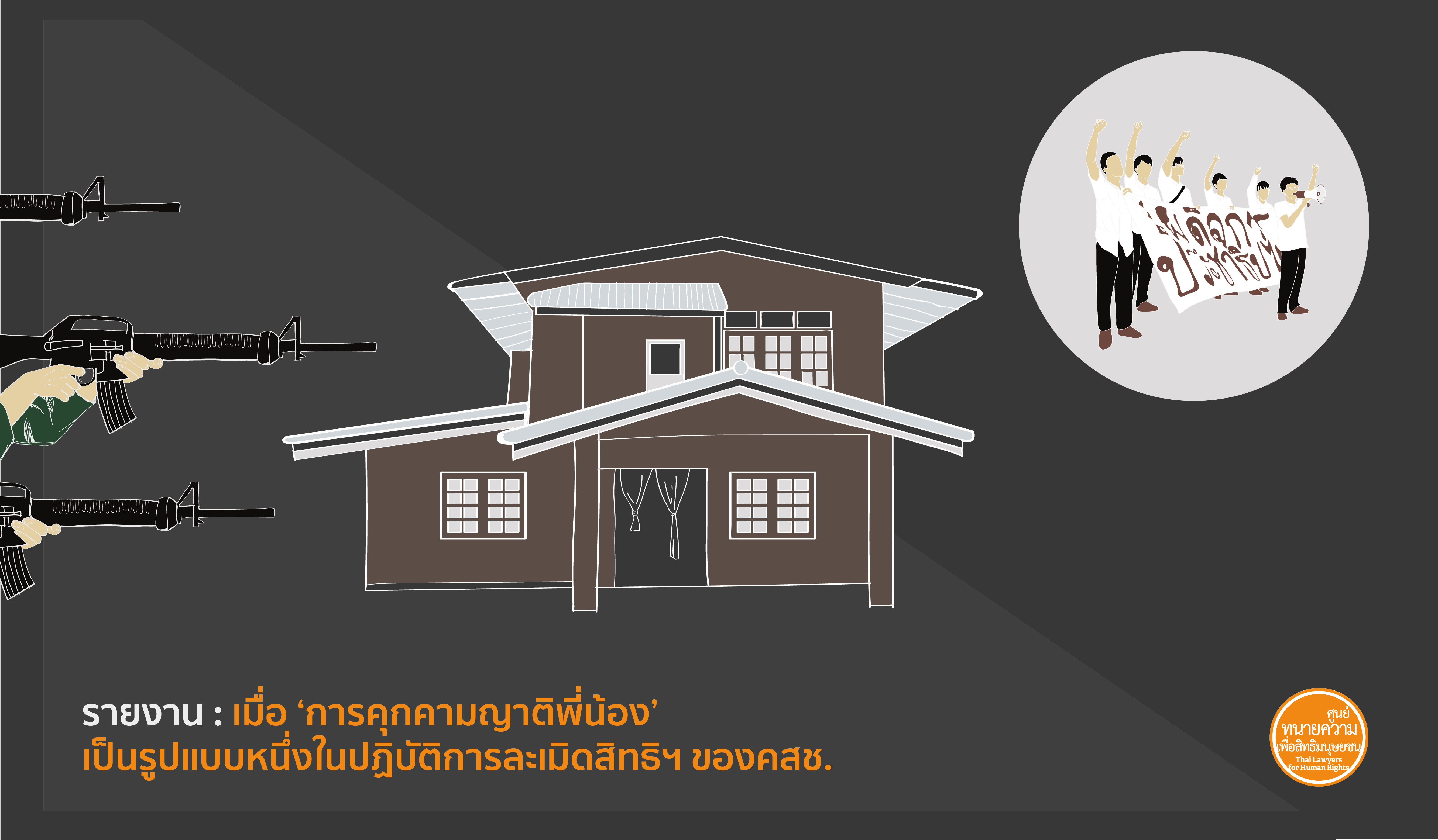
When family members become the “secondary target” of military detention.
“Persons invited to report by the military were treated with respect on the basis of human dignity. There never exists the case of harassment by the NCPO and the government.”
General Verachon Sukhontapatipak, Deputy Spokesperson of the Office of Prime Minister
Interview with the BBC on the second anniversary of the coup.
Right after the coup in 2014, the NCPO had invoked its orders to summon and detain many people for 7 days. Many were named in a list to appear at a specific time and date, while some were pursued and followed without official orders or warrants. By only citing the Martial Law’s bestowed power, the military government monitored many persons who were politically active, especially in the upcountry areas.
The junta’s practice usually begins with military officials creating a list of “targets,” most of whom are political group leaders or politically active citizens in local constituencies. The junta then employs various methods, ranging from a phone call telling them to voluntarily report themselves at local military camps, to the visits of task forces at their residences. In some cases, if the officials cannot find the “primary targets,” “secondary targets (in the NCPO’s words),” a reference for family members or relatives of the primary targets, will be taken into custody as a replacement. The purpose is to pressure the “primary targets” to report themselves to the military government.
Thai Lawyers for Human Rights (TLHR) found that, right after the coup, there were more than 10 incidents where military personnel intrusively visited the targets’ residences. Once the target was not present, they took the target’s family members or relatives as a replacement. These incidents include many relatives of politicians, the Red- Shirt leaders, local political leaders, and social activists.
For politicians, on the evening of 22 May 2014, the day of the coup, about 20 military officers forcefully entered a residence, located in Mae Ai District of Northern province Chiang Mai, of Mr Prasit Wutthinanchai, a former Pheu Thai MP. Since Prasit was not present at the scene, the officials instead took his 30-year-old son, whose work dissociates with Prasit’s political activities. He was detained in a military camp for 6 consecutive days before being released. Later, Prasit was summoned by the NCPO Announcement, and thus reported himself to a military camp in Bangkok.
For local Red-Shirt members, after the coup the military officials visited the residence and the radio station of Mr Mahawan Gawang, an owner and operator of a community radio station in Chiang Mai. His brother-in-law was instead taken by the officials into custody in a military camp for 5 days. Mahawan later contacted the officials and reported himself before his name was issued in the NCPO summons list. The military personnel took him on a van to report himself in Bangkok.
A Northern local Red-Shirt restaurant owner stated that about 10 military officials were monitoring his restaurant on the night of the coup. When the officials did not see him, his son-in-law was taken from the restaurant around midnight to a local military camp. The officials let him go only when the Red-Shirt leader requested an “exchange” of himself for his son-in-law the following morning. He was detained for 6 days.
“What if I killed a person, were they going to arrest my wife and my children when they have nothing to do with it? Does law work this way? Detaining innocent people?”
A Red Shirt leader, interview with TLHR.
A similar case happened in the same area where the said Red-Shirt leader lived. The military personnel seized and detained in military custody of another targeted local leader’s deaf-mute relative, who was not involved in any political movements and had to take care of his ailing mother. The targeted local leader subsequently had to report and “replace” himself to get his relative released.
There was also a case where 30 fully armed military officers purged a Red-Shirt member’s house and detained his sick wife and his 27-year-old daughter as replacements before forcing his wife to phone him and ask him to report himself at a local military barrack. The officials released his wife and daughter when he reported himself and was taken into custody.
In Bangkok, the military personnel searched the residence of the Pruksakasemsuks, and took Mrs Sukanya, wife of a civil rights activist and lèse-majesté detainee Somyot Pruksakasemsuk, along with his son and daughter. The three were investigated despite their lack of conviction and dissociation with Somyot’s political activities, apart from their campaigning for justice for Somyot.
![Sukanya Pruksakasemsuk, Interview on her detention on television program named “Kuen Kwam Jing” (Restore the Truth) [https://www.youtube.com/watch?v=wPtAmHQ0cuc (with English subtitle)]](https://tlhr2014.com/wp-content/uploads/2016/06/Family_intimidation5.jpg)
Further, the junta’s military personnel arrested relatives along with the suspect, and even used the relatives’ safety as a means to force confession, as seen in the case of Mr Chachawal Prabbamrung, a suspect of the Bangkok’s Big C Rajdamri shopping mall bombing. The officials took Chachawal’s wife along with him in a separated vehicle, allegedly detained her in a solitary confinement for several days, and interrogated her many times before releasing her. The officials used the safety of his wife and tortured Chachawal for a forced confession.
Many post-coup cases differently emerge in forms of harassing phone calls toward the “targets,” threatening them to report themselves, unless their family or relatives would be taken instead. This pushes many targets to voluntarily report themselves at the military camp to prevent such arrests.
Although the Martial Law was imposed throughout Thailand, it did not grant the military officers power to detain the targets’ family members or relatives in manners that the ruling junta has executed. Article 15 bis of the Martial Law Act states that
“If there is a reasonable ground to suspect that any person is an enemy or violates the provisions of this Act or the order of the military authority, the military authority shall have the power to detain such person for inquiry or for other necessities of the military. Such detention shall be no longer than seven days.”
In spite of this stipulation, many detained families and relatives have neither been involved with any political movements, nor have voiced their opinions. Many of them even have no knowledge of the political situation. They just happen to be relatives of persons targeted by the military, not an enemy of the State nor a person breaching the Martial Law. Therefore, holding them in military custody is the practice arbitrary detention.
The classification of “primary targets” and “secondary targets” remarks a military thinking used to conquer the “enemy,” as opposed to targeting civilians in Thailand. Detaining relatives and family of targeted persons resembles the “hostage-taking” tactic aimed at threatening and forcing the targets to report themselves. With no speculation of the detainees’ involvement, the military’s acts amount to serious human rights violations.
Harassments against Activists’ Families
Despite the NCPO’s suppression of anti-coup movements during the mass detention under the Martial Law, activists have continued their political activities to oppose the coup and criticise the junta’s governance. As a result, they have faced harassments in many forms. Apart from prosecutions under the NCPO self-written “law,” the activists have received military house visits, where officials meet with their family and relatives. In some cases, relatives themselves were directly summoned by military personnel.
Movements to commemorate the coup have stirred up the military’s operation. Some members of the New Democracy Movement (NDM) faced military visits after their organising the coup anniversary. On 1 July 2015, three uniformed military officials visited the Pathumthani house of Ms Chonticha Jeangrew, one of the 14 NDM student activists who were arrested and detained, and met with her mother. The officials interrogated the mother about Chonticha’s movements and political opinions, then warned her to control Chonticha’s anti-junta movements.
Ms Katanyu Muankamrueng, a student activist at Hat Yai University working to protect community rights, was politically active while the 14 NDM student activists were arrested and detained in June 2015 due to their peaceful protests against the junta. The plainclothes officials went to see Katanyu’s mother at her upcountry workplace, and warned her to cease Katanyu’s activities. She was also photographed by the officials, and later received a phone call from the military warning her about Katanyu’s continuous activism.
The family members of Ms Chanoknan Ruamsap, an NDM student activist, are also victims of the military harassment. During the past one year, they received 3 house visits by some officials. The visits mainly concern the officials questioning Chanoknan’s mother, without any request to see Chanoknan herself. For every visit, the officials photographed their house, and questioned the mother about her family’s profile and her children.
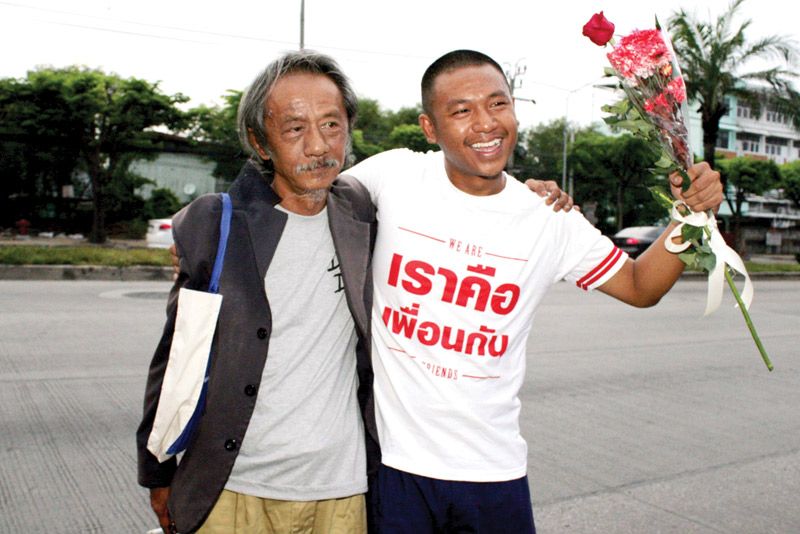
The coup commemoration organised by the Dao Din (Earthy Star) student activist group, in the Northeastern province Khon Kaen, during May and June 2015, also led to many house visits and warnings of the members’ movements. Four uniformed military officials visited the residence of Mr Panupong ‘Nice’ Sritananuwat’s family in Northeastern province Surin. They photographed his grandmother, aunt, and uncle individually, in addition to a threatening call to his father who was not home at the time. Later, the officials met with Panupong’s father and asked him to cease Panupong’s activities.
On 22 May 2015, four police met with Mr Apiwat Suntararak’s aunt at her residence in Northeastern province Roi Et, located adjacent to Apiwat’s house. They questioned the family’s profile, photographed his aunt and her residence. Days later, two military personnel met Apiwat’s father at his house, asked for his personal information and threatened him that Apiwat’s political activities might lead to a long jail term and sedition charge.
The Governor of Chaiyaphum, Northeastern province, and the municipality officers met with Mr Jatupat Boonpattaraksa’s father, Viboon, three times to inquire him about Jatupat’s information and warned him to take care of Jatupat. Furthermore, the Deputy District Chief, Kamnan (sub-district head) and some plainclothes police also visited Jatuphat’s father’s house and warned him to cease Jatupat’s activities. In June 2015, the authorities asked to see Viboon, along with other Dao Din activists’ parents, via an official invitation issued by the Faculty of Law at Khon Kaen University. Each was questioned by the officials and photographed by plainclothes officials. They were also warned to watch their children’s movements.
Apart from the student activists’ families, other targets’ were as well constantly pursued and harassed. The military personnel visited Ms Jittra Cotchadet’s sister’s residence in Suphanburi many times, although Jittra, a labour rights activist, did not live there. They attempted to speak with her father and sister, citing the 5 million Baht per Tambon Project and the Elderly Home-Visit Project, for example, to see her father. Further, during each visit the officials took photos of the residence and of Jittra’s father or persons who were present at that time. However, the officials never made efforts to talk to Jittra directly. Jittra explained that this residence was the only house in the community to receive a house visit by military personnel.
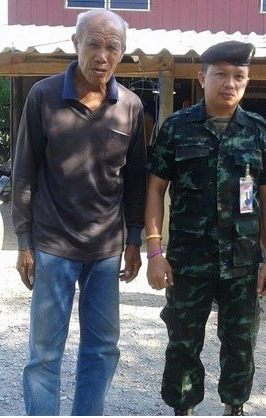
Using the targets’ family and relatives as bargaining chips, the junta has constantly intimidated and pressured pro-democracy activists to cease their expressing opinions and organising political activities.
Harassments against Families of Overseas Exiles
Domestic activists are not the only targeted group of the military. Previously, many Thai “political exiles” were unjustly charged with political offences, and decided to flee from Thailand. However, some still take parts in criticising the junta’s policies and expressing their political views. This led the military to harass and pressure the exiles’ family and relatives who still live in Thailand.
One of the cases that drew public awareness is of Mr Somsak Jeamtherasakul, a prominent pro-democracy anti-monarchist professor. According to Somsak, in November 2015, four military personnel on motorbikes dropped by his mother(93)’s house, and photographed the residence. Without talking to her, the officials left.
Mr Pavin Chachavalpongpun, a lecturer at Kyoto University who have published anti-NCPO articles, stated four-five military house visits in Thailand. In February 2016, four military officers visited his residence in Thailand and spoke with his elder sister about his political activities. An anonymous phone call was also projected to his sister at her workplace, containing similar messages she earlier received from the military. Pavin’s relatives were also warned that if he persisted with his political activities, his family would take responsibility for his actions and face troubles. The officials also threatened to summon their relatives to a military barrack. (See more at Prachatai)
In addition, many incidents of harassments against the exiles’ families were constantly reported. Most of the times, these relatives have no association with the target’s political activities, nor have expressed their opinion on politics. The incidents caused the family to fear for their safety, and created conflicts inside the family.
Prosecution against Activist’s Mother
“I’m not scared of being incarcerated. But if I were detained, no one would take care of three dependents at home. Who’s going to take care of my mother, take my children to school, and pay the utility bills? I’m working day in day out…This is unfair. I haven’t done anything wrong…In their [the junta’s] eyes, I’m wrong because I’m New’s mom…”
“Ja New’s Mother”, Her statements during interrogation. https://www.facebook.com/permalink.php?story_fbid=260460377638561&id=100010238012656
Prior, there was no prosecution against the activists’ family members. “Ja New’s Mother” was the first that advanced from post-coup harassments to legal actions.
Ms Phatnaree is the mother of Ja New, Siriwich Serithiwat, a prominent pro-democracy student activist, who has never been involved in any of her son’s political movements. She only became publicly known owing to her son’s political activities. Ja New has been arrested many times, as well as was suppressed by the military personnel to cease his political activities, in addition to prosecutions for violating the NCPO’s Orders.
In December 2015, during “Ja New”’s initiatives to organise an activity called the ‘train to the Rajabhakti Park’ to examine the corruption scandals, the mother, Phatnaree, was summoned and received a house visit by military personnel. The officials took photos of her family members and the residence, as well as pressured her to monitor Ja New. According to Phatnaree, the military threatened that if her son continued his activities, her family would “not live in peace,” before they took her to a military office.
In May 2016, the harassment against “Ja New’s” family reached yet another new level. Ms Phatnaree was indicted under Article 112 of the Criminal Code, or lese majeste offence, along with the Computer Crime Act. The charges stated that she did not speak against or try to stop a person who sent her text messages deemed anti-monarchist in her private Facebook messenger. Article 112, with previously broad interpretation, has expanded its jurisdiction in manners that the law is used as a political tool to stir public fear. The case has raised a public discussion whether it is the junta’s attempt to prosecute relatives of anti-coup activists.
Constitution Referendum under Harassment against Anti-Draft Activists
These cases present a small fraction of the military’s harassment against families of activists, movement leaders, politicians, and politically active citizens, despite their dissociation with the targets’ political activities. Following the coup, the military government has continually carried out these actions for the past two years. Many of the incidents were not made known to the public, due to the military’s claims of “secret” operations. In some cases, the harassed parties were too fearful to voice their stories.
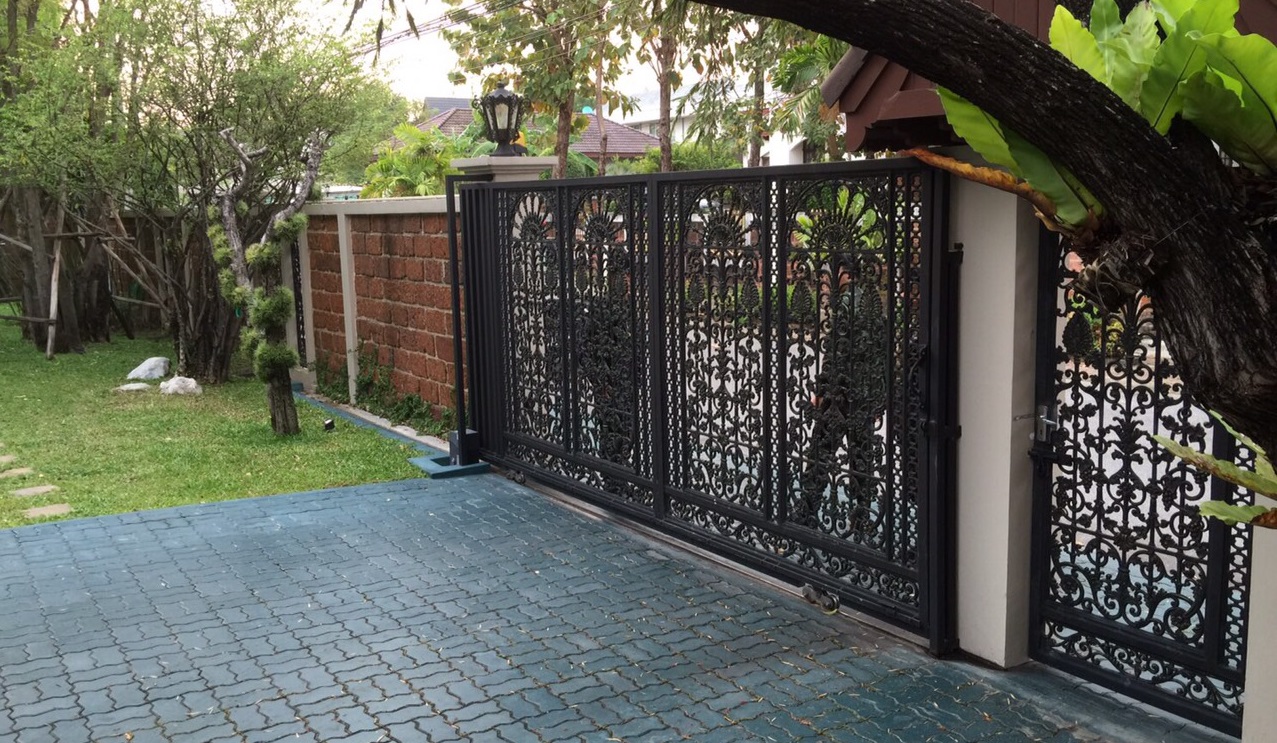
The harassment against relatives of political activists continues despite the changing surrounding of the then upcoming referendum, including those against Ms Chonticha’s, Rangsiman’s, and Mr Watana Muangsook’s family. Watana, a former Pheu Thai MP who formerly expressed his anti-draft opinions via Facebook post, which led to the officials pursuing Watana and harassing his daughter.
The deliberate and structured process organised by the military government presents a strategic method to suppress opposing voices and spread public fear among Thais. Many activists have compromised their political opinions and movements owning to the undermined family and relatives’ safety. Their family were threatened by the junta, and, as a result, pressured the activists to stop the movements. The practice has directly affected people’s right to freedom of expression and right to security and liberty of a person.
In conclusion, the NCPO’s and military’s actions inflicted on targeted activists and their relatives are an arbitrariness and abuse of power to suppress civilians who have different views. Such actions point to serious human rights violations, in contrary to the NCPO claiming of its adherence to “law-abiding,” “order maintenance,” and “creating unity”.

